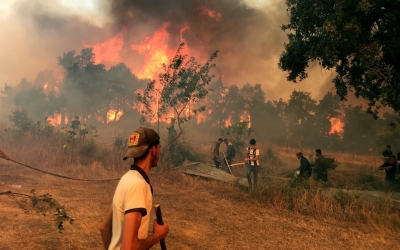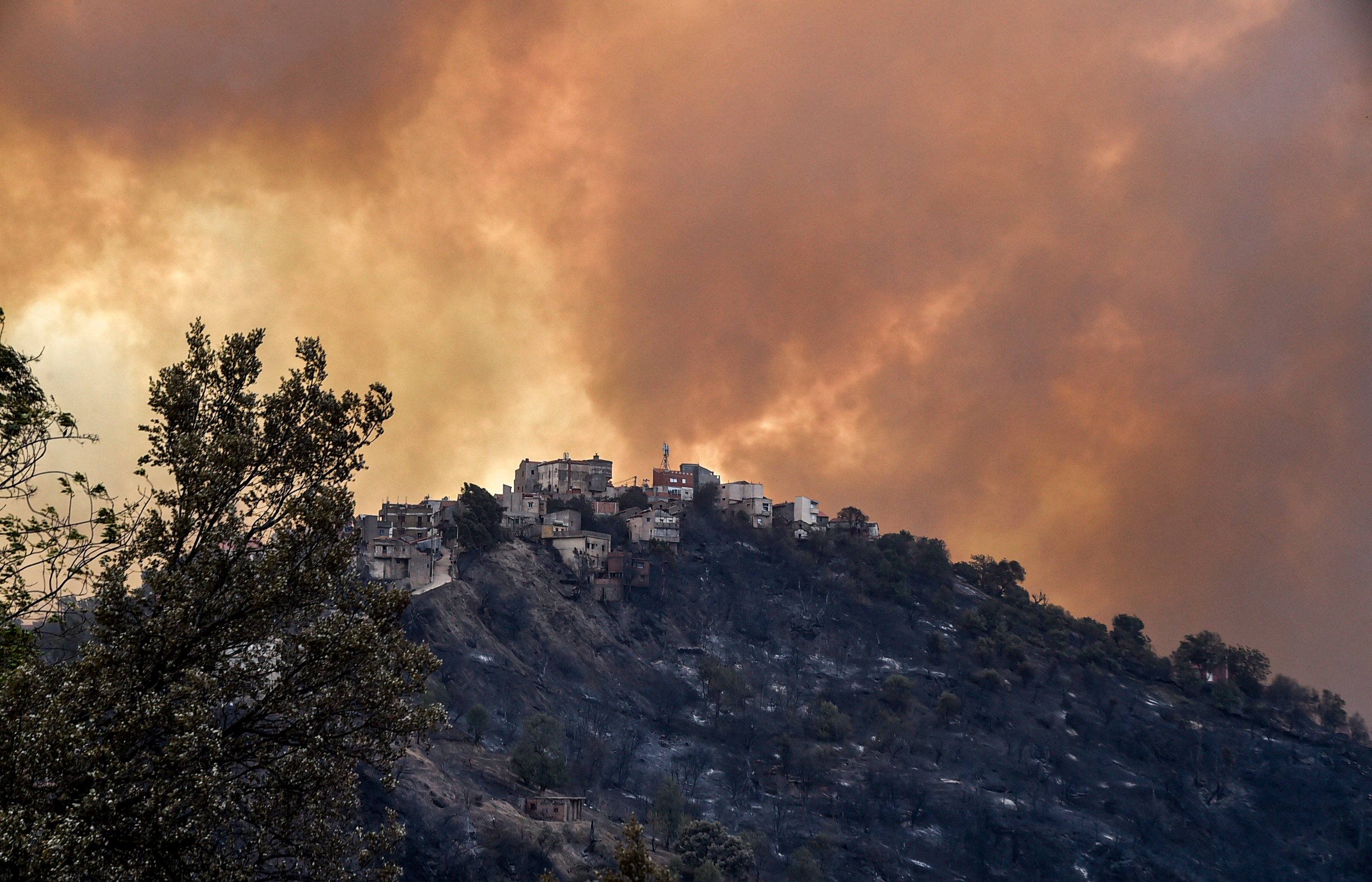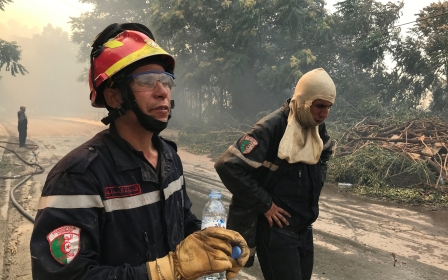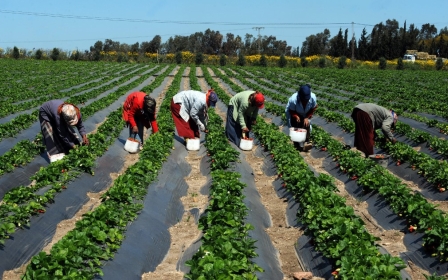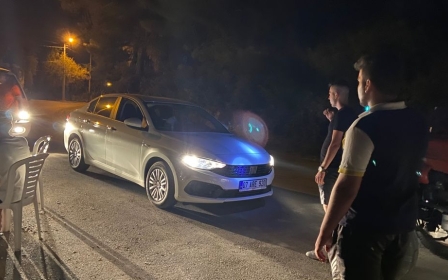'It's apocalyptic': Algeria fights desperate battle against wildfires
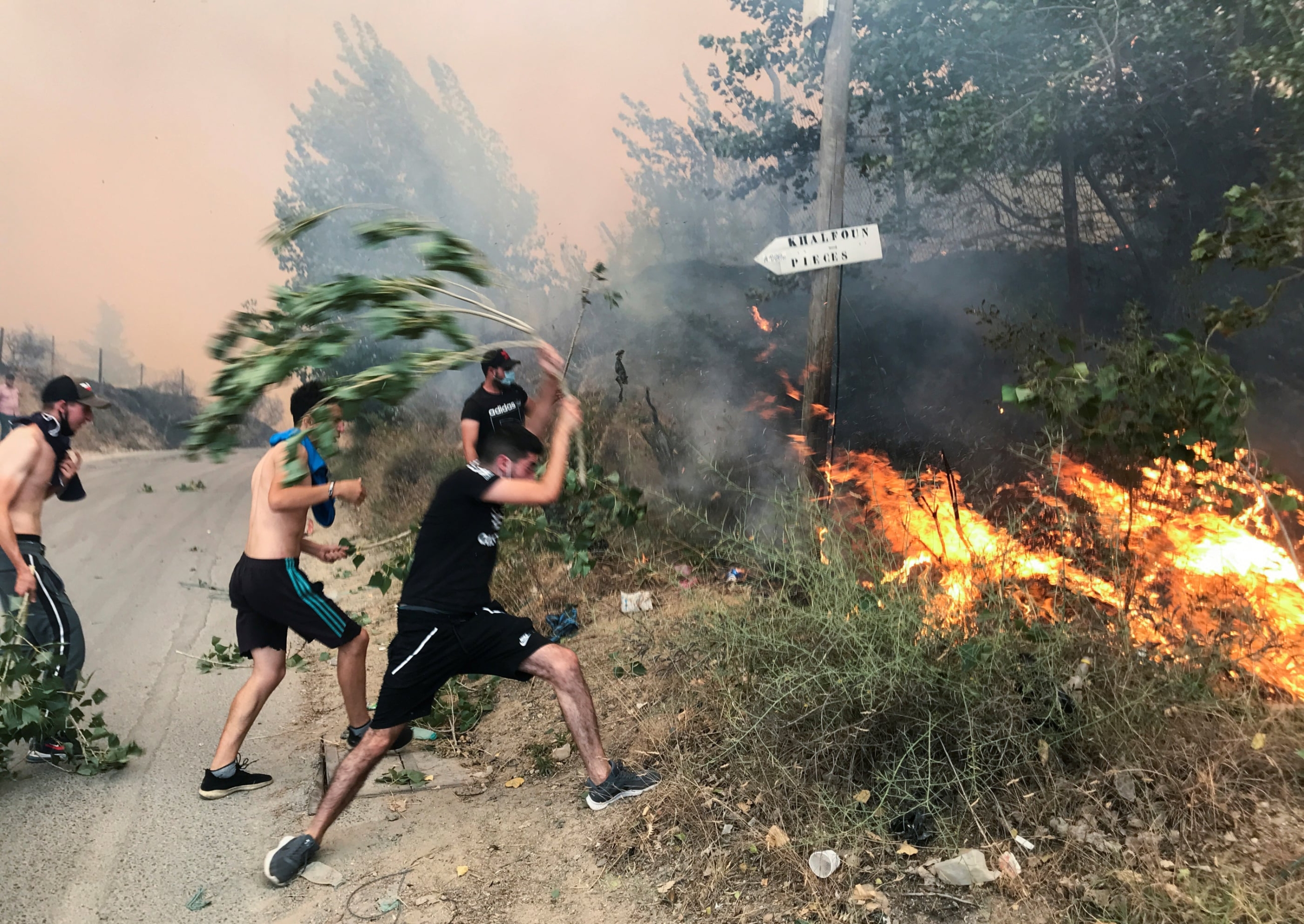
Ali didn't sleep a wink all night.
"I gathered my IDs, all the money I had left, grabbed a flashlight, put a few items of clothing in a bag, and then I waited," he said.
The pensioner tells Middle East Eye that from the terrace of his home he watched the inexorable progression of a red line of flames moving from the other side of the valley towards his village. He had built his home in the little mountain village of Ait Mimoun in the highlands of Tizi Ouzou, Kabylia, with his entire life's savings.
The next day, while facing the fire that almost surrounded him, Ali managed to flee at the very last moment with the help of a neighbour who had pushed his car right to the edge of the blaze to rescue panic-stricken victims. The fire went on to destroy a good part of the village.
Since Monday, 69 people, including 28 soldiers, have died in the fires devastating northern and eastern Algeria. According to the Algerian fire service, more than 60 fires were still burning on Wednesday in 17 districts, including Tizi Ouzou, which saw the highest loss of human life.
"The simultaneous triggering of around 30 fires, including 10 large ones in different municipalities of the district on the same day, as a special meteorological bulletin issues a heatwave alert, cannot have a natural origin," Youcef Ould Mohamed, the local conservator of forests in Tizi Ouzou, said earlier this week.
Experts say that heat, drought and wind were contributing to the dramatic spread of the blazes, similar to the climatic conditions behind fires taking place in other Mediterranean countries such as Greece, Turkey and Italy.
In addition to this wildfire-friendly climate, Brahim Bouchareb, a teacher and researcher in forestry, says there's a lack of Algerian forest maintenance, "with no lookout stations and no systematic clearing of undergrowth, which could potentially prevent the spread of devastating blazes".
Destruction in real-time
Videos shared on social media show displaced people - who have lost everything - criticising the Algerian government. In their eyes, their leaders failed to act and have been negligent. But Farouk Achour, spokesman for the nation's fire brigade, said the country "does not lack resources".
Forest fires "don't get put out with a bit of water", Achour told El Watan, adding that "specialist techniques must be in place to ensure that fires do not reignite".
On Wednesday afternoon, emergency appeals went out once again on social media as death and destruction were shown in real-time and witness accounts near-unanimously described the situation as "apocalyptic".
"We could see fire, and worse, we could feel the heat," Sara, a woman in her thirties from the village of Beni Maouche, tells MEE. "We didn't know if it was going to get to where we were. But in any case, we had no choice. We had to stay there because the roads were cut off by the flames."
Translation: Evacuated in a hurry, I’ve only got my laptop with me. According to the latest news, several houses have been affected by the fires, including my brother’s… some families have lost everything…my house, I have no idea. May God have mercy on us.
In a village near Larbaa Nath Irathen in Tizi Ouzou, young people filmed themselves trying in vain to quell the flames, as grey smoke slowly but surely surrounded homes.
On social media, countless photos of loved ones that had gone missing in the fires were interspersed with images of ochre flames.
Tragic stories also circulated online: one was the fatal end of two young girls whose burnt bodies were found clinging to that of their mother; another was that of a young, recently married farmer who asphyxiated when he tried to open the door of his chicken coop to allow the birds to escape.
Heroism and solidarity
But among these sad tales of loss, countless testimonies of heroism and solidarity can also be found.
A young woman from the village of Akli, in Tizi Ouzou, spoke of how, right in the middle of the flames, young people came on a lorry from another village, armed with nothing more than shovels and tree branches to beat back the flames.
One of the most-shared scenes shows soldiers getting ready to enter a forest aflame, cheered on by villagers who were shouting: "You are martyrs! God is with you!" and handing them bottles of water. One of the villagers approaches a young soldier at the wheel of an all-terrain vehicle and, with tears in his eyes, says to him: "Don't cry, go for it!"
Translation: My heart hurts. Families leaving their homes in tears, leaving behind their houses full of history and memories, hoping to return as soon as possible.
Donations have poured in from every corner of Algeria to aid fire-stricken Kabylia.
People have chipped in in many ways, offering those displaced a place to stay, cold storage, tractors, and tanks. Even veterinarians have joined the effort, taking in burned or injured animals.
A motorcade of young people from Khenchela, who just a few weeks ago heroically fought terrible fires at home, set off on Tuesday to do the same in Kabylia.
Translation: Chekhab Illyes, this hero helped fight the fires in Khenchela, then Tebessa and Constantine, and today he is in Tizi Ouzou.
"When I look at the registration plates of the vehicles around us, there are more than 30 districts represented. The entire country is coming to help us," says an inhabitant of Larbaa Nait Iraathen.
In Algiers alone, shops, restaurants and private schools have transformed into depots for donations in less than 24 hours, run by volunteers who organise and collect aid left by a stream of people. Similar depots stud the 100-kilometre stretch of road linking Algiers to Tizi Ouzou.
Translation: The rescue effort is everywhere. Residents of Scala.
"We are working in coordination with the village councils and local associations," Anouar, a volunteer in Algiers' Val d'Hydra neighbourhood, tells MEE.
"What do we need most? Bottled water, burn medication, cots and milk for babies, beds, blankets, mattresses, food," he listed.
Several times a day, trucks and vans carrying volunteers continue the distribution between Algiers and the regions affected by the fires.
Translation: All roads lead to Tizi Ouzou. From Oran; Béjaia; Annaba; Constantine; Ain Defla; Blida; Algiers; Boumerdes; Bouira, From all the districts in the country, volunteers collect and deliver aid, blankets, medicines, food and water…Amazing solidarity, which is nothing unusual among these wonderful people.
The Algerian national railway company has put two wagons at the disposal of people who want to make donations but who don’t have any means of transportation.
Facing this influx of donations, some groups in Kabylia have called for goods to be directed towards dedicated distribution points close to the villages, in order to avoid blocking access for water trucks and fire services.
"Tonight, we're sleeping in Algiers with my in-laws," Lamia tells MEE.
Lamia lost her home near the village of Ath Yenni, in Tizi Ouzou. Sobbing, she says she does not know what tomorrow will bring, nor how she will comfort her children, two boys aged three and five.
"But all this solidarity around us, it warms our hearts - and with it, we know not to lose hope," she says.
- This article is a translation of a story originally published on Middle East Eye's French website.
Middle East Eye delivers independent and unrivalled coverage and analysis of the Middle East, North Africa and beyond. To learn more about republishing this content and the associated fees, please fill out this form. More about MEE can be found here.


